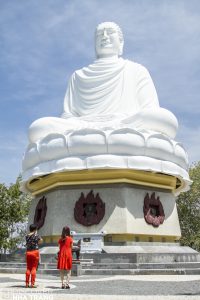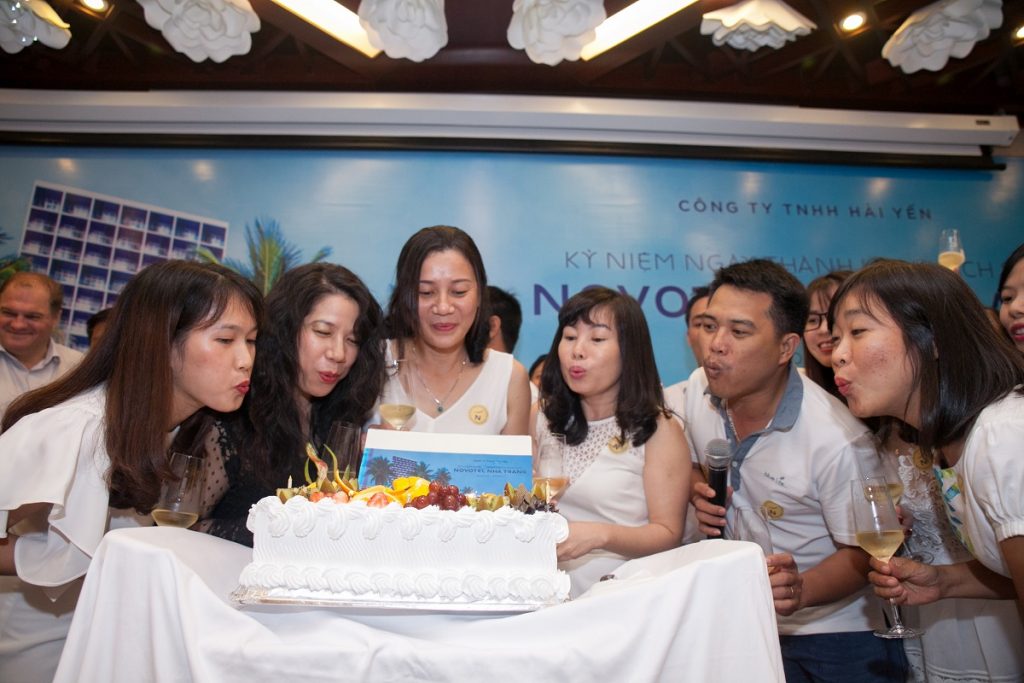Vietnam’s Last Tourism Frontier

Tuy Hoa – Phu Yen is a new emerging beach destination for Vietnamese holidaymakers and offers a taste of authentic Vietnam to foreign travellers” writes Pham Ha.
Vietnamese people became aware of Tuy Hoa after the success of the movie “Dear Brother”, directed by Victor Vu and based on the famous novel by Nguyen Nhat Anh, “Toi thay hoa vang tren co xanh”. The movie is very evocative with beautiful, peaceful scenery, rice fields, mountains, wild beaches, and islands and featured childhood games from the 1970s which my generation used to play and brought back good memories.
I arrived at Tuy Hoa as a guest on the inaugural Jetstar Pacific flight from Hanoi, a great 3-day/2-night weekend escape. I am immediately intrigued by the local accent of our tour guide who used many local words, much to our amusement. He promised that the group would experience the indigenous culture, a rich history, friendly people, stunning landscapes and local cuisine. We were full of anticipation as we set out on our new adventure to explore one of the last tourism frontiers in my own country.
Remote location, easy access
Travelers, both foreigners and Vietnamese, know Nha Trang – Khanh Hoa and Quy Nhon – Bin Dinh, but not Tuy Hoa – Phu Yen. Lying between Nha Trang and Quy Nhon, the province of Phu Yen is one that travelers generally pass through on their way up or down Vietnam’s long coastline.
The provincial capital of Tuy Hoa is 120km north of Nha Trang and has an airport with direct flights to Ho Chi Minh City and Hanoi as well as good rail and bus connections.
Some 12km south of Tuy Hoa, Long Thuy beach is a long stretch of white sand with clear waters that is popular with the Vietnamese, yet still to be discovered by international tourists.
Phu Yen has Xuan Dai Bay to the north and Vung Ro to the south and Tuy Hoa City right in the middle. Further south, Vung Ro has numerous islands that can be explored and has links to the famous Ho Chi Minh Path on the East Sea during the American war.
The North Vietnamese government secretly transferred weapons along the path on the ocean to fight America and liberate South Vietnam and relics here such as Vung Ro remind travelers of the struggle that took place to gain Vietnamese independence.
Sightseeing
Tuy Hoa is very rich in history and culture and in 3 days you can discover some of its highlights such as temples, churches, lagoons, beaches, and bays.
We stayed at the Viet Star Resort and on the first day we were introduced to the city, the signature Cham Towers in Nhan Mountain north of Tuy Hoa. O Loan Lagoon, Tam Giang reservoir, Mang Lang church and Da Dia Reef among the highlights. We were delighted by the rivers running through the countryside, sleepy villages, the deep yellow of the rice fields and the backdrop of mountains.
We visited just before Christmas and the charming 17th-century church, which is often compared to the one in Macau, is decorated for the festive season. The very first dictionary of Alexandre de Rhodes, who developed the Vietnamese language we speak today, is kept at the old A Mang tomb area near Mang Lang church.
The geography of Phu Yen province is varied and diverse with the Truong Son mountains overlooking the narrow strip of plain which is tucked between the ocean and the foothills. The province is known as one of the rice baskets of Southern Central Vietnam thanks to the reservoirs built by French, which are still used today.
The coastline has a unique feature in Ghenh Da Dia (Rocky Plate Reef), an example of a type of reef that is only found in Ireland and Jeju Island, Korea with the Phu Yen reef being the largest, according to our tour guide, Hang.
Rocky Plate Reef lies 40km from Tuy Hoa City and stretches along the South Central Coast of Vietnam emerging from the immense ocean like a gigantic honeycomb of stones. Widely acknowledged as one of the natural wonders of Central Vietnam, the giant ‘beeswax’ plate reef is made up of thousands of basalt columns, 50m wide and 200m high.
Many people know Phu Yen thanks to the movie “Tôi thấy hoa vàng trên cỏ xanh” (Dear Brother in English) as many of the scenes were filmed here. We visited all of the locations linked with the film including a school and a periodic market (a traditional market where vendors only sell one type of animal on any given day of the month, so on the 16th they only sell chickens).
We relished the panoramic view of sandy Phu Thuong Beach and wondered why there was no tourism development there. Make sure you visit before it changes! We spent some time just relaxing on this beautiful beach before returning to the Viet Star Resort.
The second day we ventured to the south of Tuy Hoa where the virtually traffic-free road runs parallel to the empty white-sand beach, reminding me of Tran Phu Boulevard in Nha Trang 20 years ago.
Vung Ro and Cap Mui Dien are the highlights in this area and the lighthouse is one of the oldest one in Vietnam with panoramic views of the ocean, reef and beach from the top. Nature lovers will enjoy the opportunity to camp on Bai Mon beach at the foot of Mui Dien and spend a little time going back to nature relaxing to the sound of the waves lapping on the shore.
Vung Ro bay is scenic with views towards the imposing Truong Son mountains. Here we pay homage to the memory of sailors who died here and learn a little about the historic ships. The tour guide says that some tourism projects are planned which will make this region more popular with travelers and enhance the local economy.
During our short time here we had plenty of sun, sand and seafood. The food was particularly delicious and were to the tastes of everybody whether they were from Hanoi or Saigon. The tuna fish and oysters were a particular favorite.
Who should go there?
Adventurers and intrepid travelers, explorers, photographers, families and people who want to discover exotic places where you are among some of the first people to visit and will enjoy the solitude. It is also an ideal location for team building company trips and I certainly plan to bring my staff here this summer.
When?
The climate in the region is one of the best and most stable in the country, with a minimum of rain and a balmy average temperature of 28c all year round. The weather in Tuy Hoa is similar to Nha Trang due to its close proximity. It is a year-round destination, but the best time to experience it is from June to September when you can expect dry weather and blue skies.
Accommodation
There is currently limited choice for accommodation but what is there is some of the best around. The range includes:
Viet Star Resort and Spa, vietstarresort.com, 5 star Vietnamese standard located just 15 minutes from the city, on a hilltop close to Highway 1 and the railway station. Ideal for both the MICE and leisure market.
Cendeluxe Hotel, cendeluxehotel.com, a 5-star property with a central location and great views at very affordable prices.
Ho Tram Hideaway, http://www.
Kaya Hotel, http://www.kayahotel.com.vn/, a 4-star city hotel with easy access to the beach.
Yasaka Huong Sen, http://www.
Getting there.
Jetstar Pacific has just opened new routes from Hanoi -Tuy Hoa and Saigon-Tuy Hoa. In addition, travelers can go to Nha Trang and reach Tuy Hoa in 2 hours by car along a very scenic highway. Train and bus services are also available for travelers who have more time. You can even combine two destinations Nha Trang – Khanh Hoa and Tuy Hoa – Phu Yen in one trip to make the most of your time.










